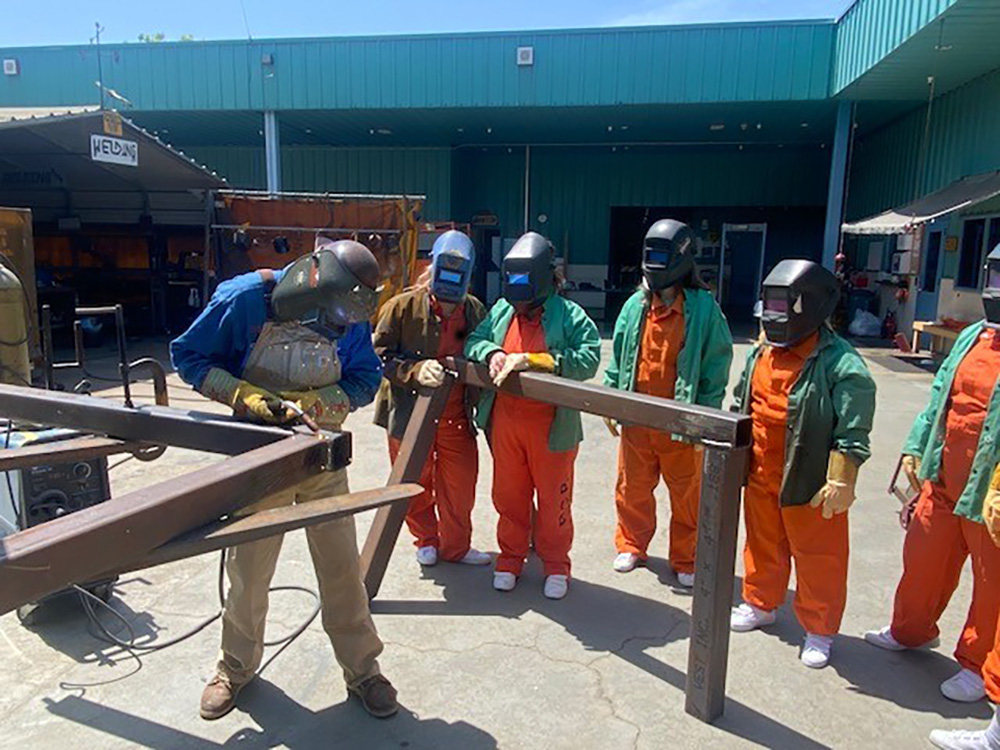County’s College Collaborative System Is a Game-Changer for Justice-Involved Students
County of Santa Clara partnership with six community colleges breaks down barriers to offer continuing educational opportunities for those in custody

Students learn how to weld at San José Community College. The college is one of six in the South Bay that serve people who are incarcerated in Santa Clara County as part of a unique collaborative program that offers a variety of courses aimed at creating opportunities for individuals when they are released.
SANTA CLARA COUNTY – They’re just like other community college students enrolled in a vocational program – they can be found tucked under the hood of a hooptie, inside a shower of arc-welding sparks, or flour-handed with a batch of oven-bound biscuits.
But this particular cohort is part of a model collaboration that originated in Santa Clara County and has grown to nearly 600 participants this year: They’re justice-involved students, and the courses they take are either at the Elmwood Correctional Facility or at one of the six participating community colleges in the South Bay. It’s a unique effort led by Dr. Patrick Marshall, the inmate rehabilitation manager of the Santa Clara County Sheriff’s Office.
“If you really want to decrease crime and decrease recidivism like we always talk about, you’ve got to give people a chance,” said Marshall. “You’ve got to give people hope. And that’s what our mission is. That’s what our belief is.”
Marshall says what’s key to the County-college collaboration is just that – getting educational organizations from different districts on the same page to best offer opportunities to a segment of the community most in need of knowledge.
Veterinary instructor Shaelyn St. Onge-Cole demonstrates technique to a group of students at Elmwood Correctional Facility.
Gavilan College President Pedro Ávila says he’s never seen anything like it before.
“They flipped the prison,” said Ávila. “They flipped the prison into a community college. Dr. Marshall has broken barriers – colleges compete with each other because we are neighboring districts, but when it comes to this project, we are all working together to serve these students.”
Ávila says in some ways it is better than traditional community college because the courses that best serve the incarcerated students are selected – by educators, employers and the students themselves – based on what will offer them the best opportunities once they are out.
That can be welding or electrical basics, courtesy of San José City College. Or Auto 101 from Evergreen. Ohlone College offers communication studies (including multimedia and podcasting) while Foothill College has a popular pathway toward becoming a veterinary assistant. The newest offerings at Mission College involve culinary courses that go from kitchen sanitation to menu planning to actual food preparation.
“We have one of a few culinary programs in the country,” said Mission President Dr. Seher Awan, adding that last term’s students delivered a sampling of their confectionaries. “The students are so sweet – they sent me so many muffins, too many! I ate some, and they were delicious.”
A core component – incorporated by all the colleges – is the additional services the students receive: Health services, accessibility, childcare. Everything all the other students receive is available for participants of the County’s College Collaborative System, and at no cost. Additionally, once they are out of custody, they are able to continue their course work at any of the participating colleges, and all costs remain waived.
“We see individuals embracing and empowering themselves, getting hope that this is an opportunity,” said Marshall. “And we support them so much and give them that wraparound support.”
Across the state, more and more community colleges offer vocational training for those in the justice system; it went from just 12 programs a decade ago to 80 colleges participating in the Rising Scholars program last year, serving over 16,000 students per semester. And what’s going on in Santa Clara County is being noticed, particularly the cross-district coordination.
“No other groups in California are doing this kind of collective collaborative work,” said Awan. “No other group of colleges offers as robust a variety of classes. This program is leading the state in educating individuals who are justice impacted and incarcerated – that’s incredibly impressive.”
The veterinary instructor at Elmwood, Shaelyn St. Onge-Cole, says that, ultimately, it’s all about the students.
“We can get people to recognize them -- that they are students, they are individuals, that they have stories,” she said. “A lot of them have trauma behind them that we could never imagine. They deserve second chances, and that’s what rehabilitation is all about."